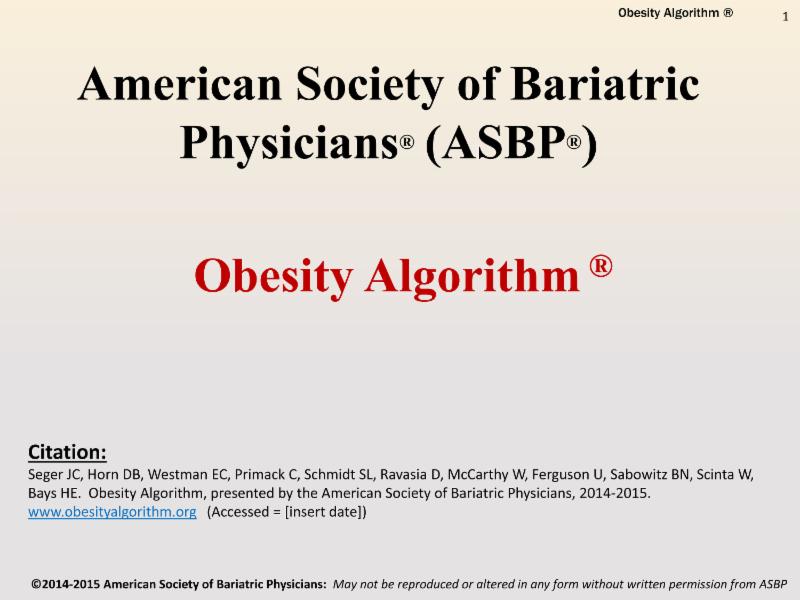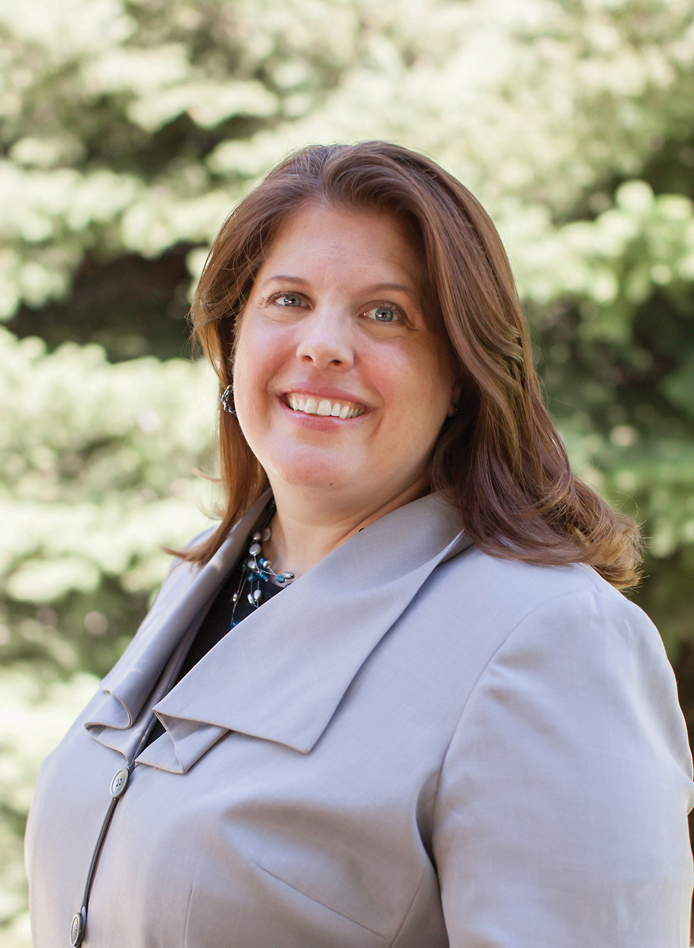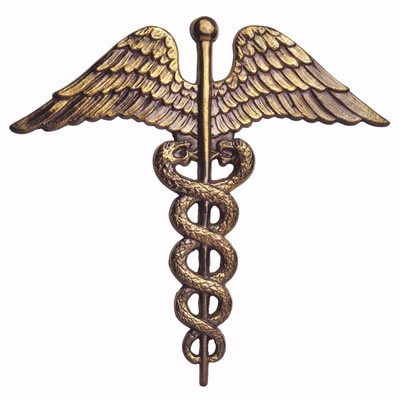Featured Course:
Obesity Basic Medical Treatment (OBMT)
|
|
Contact Us
| |
Bariatric Physicians
2821 S. Parker Road
Ste. 625
Aurora, CO 80014
303.770.2526 | asbp.org
Staff
Laurie Traetow, CAE, CPA
Executive Director
laurie@asbp.org
Beth Amelon
Sponsorships & Exhibits Coordinator
beth@asbp.org
Carly Crosby
Meeting Planner & Executive Coordinator
carly@asbp.org
Marcie Gonzales
Receptionist
marcie@asbp.org
|
|
|
|
Obesity Medicine e-Weekly
|
News
 Learn how to use the Obesity Algorithm: Educational webinar available online Learn how to use the Obesity Algorithm: Educational webinar available online
This afternoon, Dr. Harold Bays conducted a webinar about the revised Obesity Algorithm®, presented by ASBP. The algorithm was updated earlier this year and now includes new content about the physiology of obesity, its effect on other medical conditions, and new ways to approach and treat obesity with patients. Dr. Bays provides an overview of the new content in this hour-long webinar. Members can access the recording of the webinar online tonight before it's released to the general public tomorrow. If you haven't already, download a copy of the revised Obesity Algorithm, and then watch the webinar.
 Visit the members-only online portal to access practical resources Visit the members-only online portal to access practical resources
ASBP members can access a number of helpful resources through the ASBP members-only online portal. This page was recently updated to make it easier than ever for you to find exactly what you're looking for. Browse through the available resources about obesity research, business management, insurance and billing, pediatric obesity, and more. To view this page, login to your ASBP account, then click "Other Resources" on the left side of the window.
 First Obesity Basic Medical Treatment course only a few days away First Obesity Basic Medical Treatment course only a few days away
The first of the winter season of Obesity Basic Medical Treatment courses takes place in Washington, D.C., on Jan. 31. This newly revised course introduces the different treatment options available to patients affected by obesity and provides a general overview of each option. Learn more about this course. Can't make it to D.C.? See a list of all 2015 dates and choose a course in a city near you!
 Congratulations, Dana! Congratulations, Dana!
ASBP Director of CME and Finance, Dana Mansell, recently earned the Certified Healthcare CPD Professional credential. This credential recognizes Dana's knowledge of working in the continuing education industry and providing continuing professional development (CPD) programs to all health care providers. Congratulations, Dana!
|
Resources
 The Obesity Treatment Foundation (OTF) helps keep you up to date on current obesity research! Each week, OTF publishes a brief overview of three recent studies so you can be in the know, even during your busiest days. Click the titles below to view the full articles, and please consider supporting OTF so we can continue to provide you with updates on the latest research. The Obesity Treatment Foundation (OTF) helps keep you up to date on current obesity research! Each week, OTF publishes a brief overview of three recent studies so you can be in the know, even during your busiest days. Click the titles below to view the full articles, and please consider supporting OTF so we can continue to provide you with updates on the latest research.
Keast, R. S. J., et al. British Journal of Nutrition, 2015.
Caffeine is an ingredient in more than 60 percent of sugar-sweetened beverages (SSB). The effect that caffeine has on the consumption of SSB is not known; therefore, a study was conducted to examine whether caffeine increased SSB consumption when compared to a same-tasting non-caffeinated SSB in a free-living population. Results showed that participants who drank the caffeinated SSB had a daily SSB intake of 419 milliliters per day (ml/d) during the 28-day study, whereas participants consuming the non-caffeinated SSB drank 273 ml/d, significantly less. There was no flavor difference between the beverages; however, the caffeine group reported liking the SSB more than those who consumed the non-caffeinated SSB. The presence of caffeine in SSB significantly increases consumption, and regulating caffeine may be a way to reduce the consumption of sugar-sweetened beverages.
Biswas, A., et al. Annals of Internal Medicine, 2015.
Data from 47 studies were examined to quantify the association between sedentary time and hospitalizations, all-cause mortality, cardiovascular disease, diabetes, and cancer in adults independent of physical activity. The researchers found that prolonged daily sitting was linked to significantly higher odds of heart disease, diabetes, cancer, and dying. Even study participants who exercised regularly had worse health outcomes if they sat for long periods. However, those who did little or no exercise faced even higher health risks. These findings suggest that engaging in a bout of exercise is not enough to overcome the detrimental effects of sitting most of the day and finding ways to reduce sedentary time throughout the day may have beneficial health effects.
Outcome reporting in bariatric surgery: An in-depth analysis to inform the development of a core outcome set, the BARIACT Study
Hopkins, J. C., et al. Obesity Reviews, 2015.
A systematic review of bariatric surgery studies was conducted in order to examine the consistency and outcomes reported in published studies. Outcome data from 118 papers was included. The researchers found more than a thousand different verbatim outcomes, 85 percent of which were reported only in one single study. The largest outcome domain was "surgical complications," and 42 percent of outcomes corresponded to a type of "adverse event." Percentage of excess weight loss was the main study outcome in 49 studies, but there were 14 different ways of reporting weight loss, and nearly 40 percent of weight-loss outcomes were heterogeneous and not comparable among studies. Almost 25 percent of papers did not report a weight-loss outcome. This article proposes a core outcome set for reporting the surgical treatment of severe and complex obesity.
|
Education

Register now for the highly anticipated spring conference
Obesity Medicine 2015 is expected to exceed last year's attendance! This conference offers clinical and practical knowledge about a variety of topics related to the medical treatment of patients affected by obesity. Join us in Denver for the annual spring conference, which includes three courses packed with all-new content for 2015!
- Full Conference
30 CME | April 8-12
Includes the Spring Obesity Summit and your choice of either Obesity Medicine Essentials (register) or the Nutrition and Metabolism Symposium (register). - Dr. Harold C. Seim Obesity Medicine Essentials
12.75 CME | April 8-9 | Register
Gain practical knowledge in this how-to series about the medical care of patients affected by obesity. - Nutrition and Metabolism Symposium
12.75 CME | April 8-9 | Register
Broaden your understanding about a range of diet and nutrition options based on scientific research. - Spring Obesity Summit
17.25 CME | April 10-12 | Register
Enhance your knowledge about the latest scientific research and trends related to the evaluation and treatment of patients affected by obesity.
Want more? Save the date for Overcoming Obesity 2015: Diagnose. Personalize. Treat. in Washington, D.C., from Sept. 30-Oct. 4, 2015.
  Obesity Basic Medical Treatment course registration now available Obesity Basic Medical Treatment course registration now available
Do you know anyone who wants to learn the basics of medical obesity treatment but doesn't know where to start? The Obesity Basic Medical Treatment (OBMT) course teaches physicians and health care providers who are brand new to the field of obesity medicine about the basic approaches to obesity treatment. Attendees can then decide whether or not to pursue further obesity medicine education or understand when to refer a patient to an obesity medicine clinician. Learn more about this course, or download a printable registration form. Online registration is also available for the following dates and cities.
|
|
|
|
|